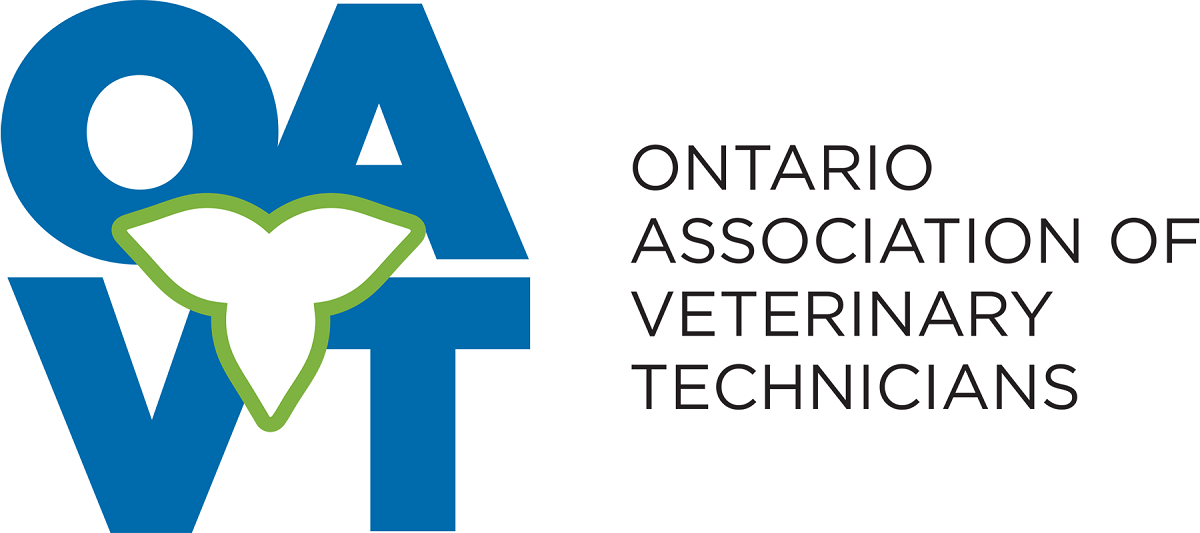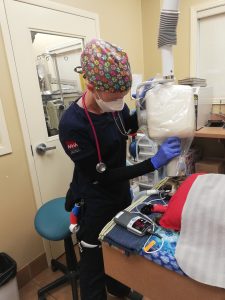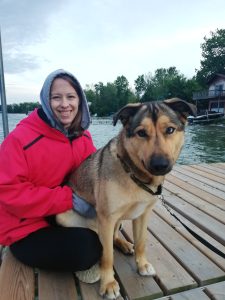Lorna Orpwood, BSc Hons., RVT
Where did you go to school and what made you decide to take a Veterinary Technician program?
I went to Trent University and graduated with a Bachelor of Science with Honours in Biology in 2012. I had the opportunity to take many animal-based courses throughout university and along with volunteering at animal welfare organizations, those learning opportunities lead me to pursue veterinary technician school. I graduated from Seneca College with a veterinary technician diploma with high honours in 2014 and quickly learned how important and diverse the job of a Registered Veterinary Technician was. I am always grateful for the opportunities that lead me to this career path.
What is your current job(s)? When did you start it? What are your primary responsibilities?
I currently work at Campus Estates Animal Hospital, a 24-hour veterinary hospital that functions as a small animal/exotic general practice during the day, and a small animal/exotic emergency hospital outside regular business hours. We work with a variety of species including dogs, cats, and exotics including rabbits, pocket pets, reptiles, and birds. I started working at this hospital in June 2021. As one of the RVTs, roles are rotated depending on the day or week. I can be assigned as a hospital treatment technician; a surgery technician; an appointment technician; a pharmacy technician on any given day or a late night/overnight technician on some weeks. I also am part of the Nutrition Advisor team. I have time set aside each week to perform nutrition consultations with clients, helping guide them in selecting the best diet for their pet, or answering any questions they may have about nutritional health. Whether it’s assisting an owner get their obese pet on a weight management plan; a mature pet on a senior diet that will better support and prolong their remaining years; or giving encouragement through an allergy feeding trial, I’m able to take that time to answer any questions a client may have.
What do you love about your current job?
I love the diversity and the endless opportunity for learning. Every day is a bit different, with the rotating RVT roles. I also get to work with a variety of species, including exotics and birds, which means no two days can ever be the same. One day I might work with a dog, a cat, a bird, a rabbit, and a ferret all within the first couple hours of my shift. I have an interest and passion in so many aspects of veterinary medicine that having those varying roles allows so much opportunity to utilize the knowledge and skills I’ve acquired over the years. It also allows me to practice and learn new skills or work with species I have less experience with.
What other jobs have you had in the RVT field?
My current position is the fourth veterinary hospital that I’ve worked at in my 8-year career since graduating from veterinary technician school. Most recently, prior to my current position, I was a Lead RVT at a busy 2-3 doctor veterinary hospital for 5 years. In past positions throughout my career, I’ve been the RVT responsible for hospital tasks including managing inventory, controlled drug logs, laboratory/radiograph equipment, and surgical equipment, in addition to regular daily RVT duties. I am grateful for each opportunity I was given throughout my career thus far, as every position I’ve had in the field has provided learning experiences and building blocks that have helped make me the RVT I am today. Throughout my career, I’ve also had the chance to volunteer at 3 spay/neuter clinics in northern Ontario communities organized through Finding Them Homes – James Bay Pawsitive Rescue. These trips were so rewarding to be able to help communities that do not have veterinary access but also to have fun doing veterinary work outside of a regular hospital setting.
What or who has had a significant impact on your career as an RVT?
Ever since I graduated my goals as an RVT have always been the same. Always keep learning, and always be the best RVT possible for every patient you encounter. Sometimes a reminder of those goals that may have become buried over time is needed. Winning the RVT of the Year award for 2020 had an impact on me and my career as an RVT. 2020 was a very difficult year, with the pandemic just starting and veterinary medicine struggling to adapt. I was in a position with extensive responsibilities, and with hours and staff cuts, it became more and more difficult. I was struggling to keep up, extremely burnt out, and constantly felt like I was never doing enough. I was feeling lost and questioning myself as an RVT. Even after receiving the award, it took quite a while for me to mentally accept it was justified. Reflection and time helped me stop questioning and start bringing those goals back to the surface. Although not instantaneously, it helped remind me that I am enough and led me to take the step towards my next path in my career as an RVT.
If you could encourage other RVTs to focus on ONE thing to improve their skills or overall wellbeing, what would it be?
Believe in your capabilities and know your worth and value. No one is perfect and bringing confidence to trying new skills and learning while lessening negativity will help lead to success.
RVTs are passionate people, and every RVT has an area they are most passionate about (nutrition, research, spay/neuter, dog bite prevention, education, etc.) What is your passion? Does your current job allow you to fulfill your passion?
I’ve loved anesthesia and analgesia for a long time. It can be stressful sometimes, especially in higher-risk procedures, but monitoring a patient so that they have a smooth surgery and knowing you guided them through safely can be so exhilarating. My current position has allowed me to increase my knowledge and understanding of anesthesia and analgesia with the use of CRIs, but also in exotics and birds, which adds a whole new knowledge base layer than I had previously. I also have a growing interest in nutrition, as so many pet owners have misinformation or just a lack of knowledge when it comes to this subject. This is an area in veterinary medicine that RVTs can be performing so much more but is often pushed aside or missed.


